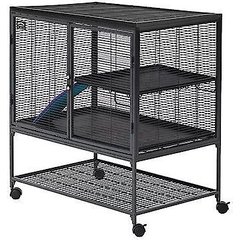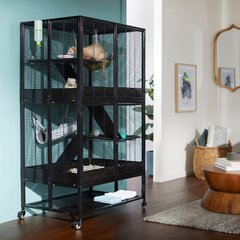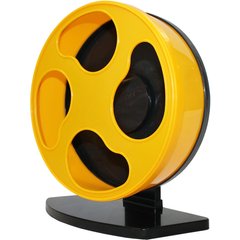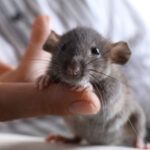Pet Rats 101: A Beginner’s Guide to Keeping a Rat as a Pet
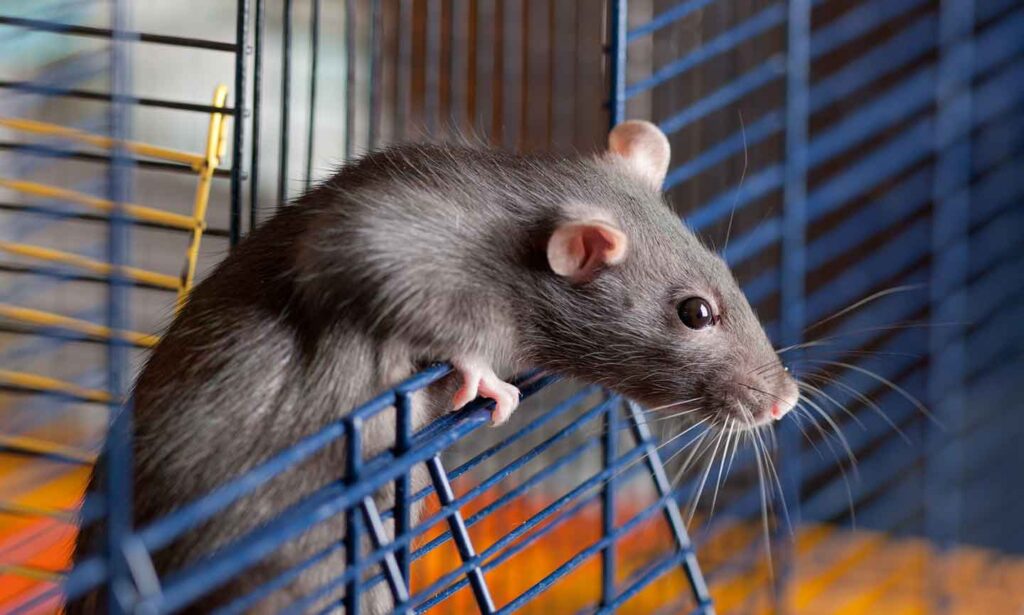
Photo by Argument/iStock/Getty Images Plus
Rats are incredibly smart, social animals who make wonderful companions. If you’re curious about keeping a pet rat, keep reading to learn all the basics of rat care, including ideal habitat, dietary needs, and handling advice.
Pet Rats: An Overview
- Scientific name: Rattus norvegicus
- Range of sizes: 13–18 inches; 0.5–1.1 lbs in weight
- Life expectancy: 2–4 years
Fun Facts About Rats
- Rats have a unique set of teeth. They grow continuously throughout their lives, so rats need to gnaw on objects regularly to keep their teeth trimmed and healthy.
- Rats have a superb sense of smell, taste, hearing, and touch. Their whiskers are highly sensitive and help them navigate in the dark.
- There are about 60 species of rats worldwide.
Pet Rat Supply Checklist
- Large wire enclosure with a solid bottom
- Bedding
- Enrichment decor, like hammocks, exercise wheels, and chew toys
- Cage cleaner
- Small pet carrier
- High-quality rat food
- Food dish
- Water bottle
Rat Cages
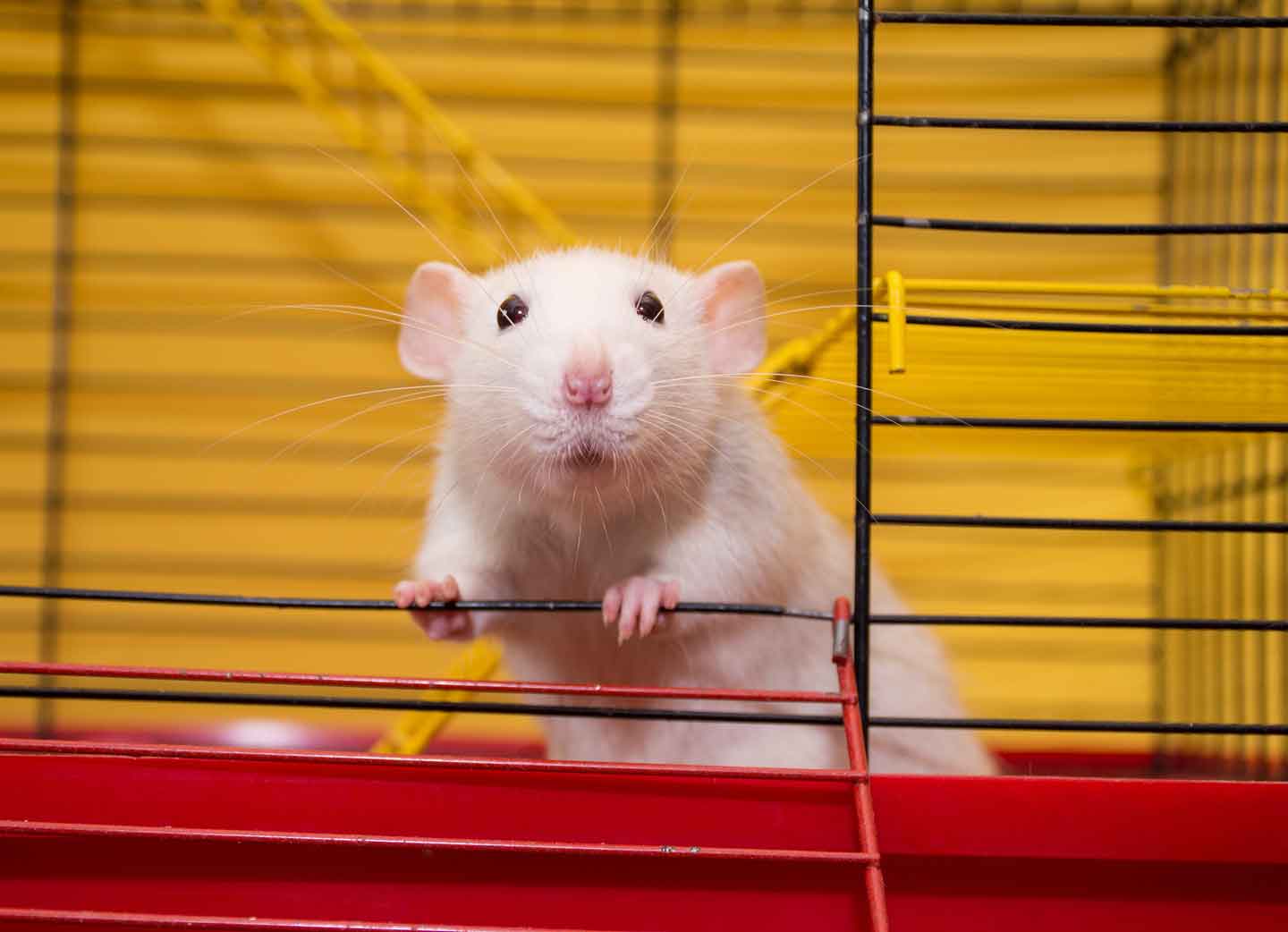
Olena Kurashova/iStock/Getty Images Plus
Setting up your pet rat for success starts with an inviting, spacious habitat filled with enrichment toys and devices.
Enclosure
Rats prefer multilevel wire cages that provide ventilation. The spacing between the bars shouldn’t be wider than half an inch to prevent these clever animals from escaping. While the walls and roof should be wire, a solid bottom is ideal, since all-wire floors can be harmful to their little feet.
“Rats are active and need plenty of space,” notes Denise Pancari, DVM, a veterinarian at Heart + Paw’s Animal Medical Hospital of Centereach in New York. “A cage with multiple levels, ramps, and hiding spots is best.”
Rats need a larger cage compared to other rodents, such as mice. At minimum, rat cages should be:
- 20 inches long
- 14 inches wide
- 24 inches high
Recommended Products
Rat Bedding
Though it may seem like a small thing, choosing the best bedding material for your pet rat is crucial to their health, happiness, and comfort. Dr. Pancari says rats love to burrow in the bedding you choose, so in that sense it provides a place to sleep, hide, and play.
“Often, a fleece blanket properly laid could work, or opt for paper-based bedding or Aspen shavings,” Dr. Pancari says. “Avoid cedar or pine shavings, as they can emit harmful respiratory toxins. Ensure a sufficient depth of at least 2–3 inches to allow your rats to burrow and nest.”
A tried and true favorite is the Small Pet Select Aspen Bedding.
Enrichment Decor
Just like other animals (including humans), rats need some good old-fashioned entertainment to keep them mentally and physically well.
“It is important to include an environment that caters to a rat’s natural behavior,” says Dwight Alleyne, DVM, a senior associate veterinarian at Petfolk in Sandy Springs, Georgia.
“Places to hide—such as tunnels, igloos, and hammocks—are of great benefit,” he says. “Also, toys that allow them to grind their teeth; exercise wheels; and climbing structures are helpful to maintain an enriching environment.”
Recommended Products
Old cereal boxes, and paper towel or toilet paper tubes are great, cost-effective playtime options too.
Pet Friends
Pet rats are highly social animals, and generally thrive when kept in same-sex groups or pairs. By keeping rats in pairs or groups, you can provide them with much-needed companionship, mental stimulation, and opportunities for social behaviors like grooming and play, which are important for their well-being.
Ideally, rats are purchased or adopted together at a young age so they can bond properly. If you do introduce a new rat to an existing one, it’s important to do so slowly.
Female rat pairs tend to do best, but male rats can get along well with each other if they were introduced at a young age or have been properly socialized. Male and female rat pairs aren’t ideal, since this can lead to reproduction—and rats are very good at making offspring!
Cleaning and Upkeep
Cleaning your new pet’s cage is an important part of creating a healthy environment, since it prevents disease and nixes odors.
“Daily removal of soiled bedding, uneaten food, and droppings is a must,” Dr. Pancari says. “Once a week, remove all bedding, toys, and accessories, and clean the cage with mild soap and water. Rinse thoroughly and dry before replacing with fresh bedding and clean toys.”
On a monthly basis, she says to use a pet-safe disinfectant, such as Nature’s Miracle® Small Animal Cage Cleaner Spray, to sanitize their cage. Again, make sure to rinse well to remove any residue.
What Do Rats Eat?
A rat’s diet primarily consists of premade dried rat pellets, which you can find at most pet stores, says Dr. Alleyne. Examples of this include the Mazuri® Mouse & Rat Food and Kaytee® Forti-Diet Pro Health® Mouse, Rat & Hamster Food. He adds that rats can also eat fresh vegetables and fruits.
For pet rats, fresh food should constitute about 10% of their total diet, while the remaining 90% should consist of high-quality commercial rat pellets or blocks. This ratio ensures they receive essential nutrients from the pellets, while benefiting from the variety and hydration that fresh foods provide.
How Often To Feed Rats
Typically, rats are fed twice daily, with portion sizes adjusted based on their age, size, and activity level. Follow instructions on the dry pellet packaging to prevent overfeeding or underfeeding, which can result in issues such as obesity or malnourishment.
Water Requirements
Along with food, make sure your pet rat has access to fresh water at all times. You can use a sipper water bottle designed for small animals that attaches to their cage interior, like the Lixit® Deluxe Glass Water Bottle.
You may also want to provide a shallow water bowl to give them options. (Plus, Dr. Pancari says they like to play in water, which is adorable.)
Every day, clean and refill their water bottle and water dish to prevent bacterial growth and to encourage good hydration. Monitor their water intake regularly to ensure they’re drinking enough, especially when temperatures are warmer.
Harmful Foods for Rats
Dr. Pancari says to avoid feeding pet rats the following harmful items:
- Citrus
- Onions
- Garlic
- Chocolate
- Caffeine
- Raw peanuts
- Sugary foods
- Fatty foods
- Xylitol (an artificial sweetener)
Handling a Rat

Vladimir Dyavhkov/ iStock / Getty Images Plus
Domestic rats are very social creatures, and many do enjoy being held and petted. This consistent interaction helps enrich their daily lives and is a key aspect of pet care—but first, you will need to build some trust.
“Let them come to you first,” says Dr. Pancari. “Speak softly and move slowly.” When you do handle them, she adds, “scoop them up gently from underneath, supporting their hindquarters.”
Spend time handling your pet every day to strengthen your connection and build your bond. Along with handling them, you can also let them explore outside of their cages under strict supervision.
“They are very inquisitive, and you can allow them to explore new environments safely,” Dr. Pancari notes. Safely is the key word here, she adds. “Ensuring your rats’ safety involves awareness of potential hazards. Keep cleaning products, plants, and foods toxic to rats out of reach. When outside the cage, supervise them to prevent chewing on electrical cords or other dangerous items.”
Rat Health
Signs of a healthy rat include:
- Clear and bright eyes
- Clean ears free of crustiness or discharge
- A coat that’s shiny and smooth
- Quiet, unlabored breathing
- Well-proportioned weight
- Regular elimination and bowel movements
- A curious, social, and active personality
Common Rat Health Problems
Dr. Alleyne says common health concerns for rats include:
- Upper respiratory or lower airway infections, such as sneezing and wheezing
- Mammary tumors, which are usually benign but can be malignant, and are more common in older rats
- Overgrown teeth, which are caused by not eating a dry pellet diet/crunchy vegetables
- Skin issues, typically caused by parasites, bacteria, or injury
- Hair issues, often caused by “barbering,” in which one rat chews the hair of another, or when a rat chews their own hair
When To See Your Vet
Regular vet checkups are important and vital to the health of your rat, Dr. Pancari says. Pet rats should ideally see a veterinarian experienced with small animals for a thorough checkup at least once per year—even if they appear healthy. This allows for early detection of potential health issues.
Signs and Symptoms of Illness
Additionally, signs of illness or changes in behavior warrant prompt veterinary attention to address concerns promptly and effectively. This includes:
- Changes in appetite
- Changes in elimination or bowel movements
- Low energy levels
- Any abnormalities in breathing or movement
How To Find a Rat Vet
Start by calling a local trusted veterinarian to see if they have recommendations for vets specializing in rat care. Alternatively, search online for rat veterinary care specialists and read reviews to get a feel for their facility.
How To Choose a Pet Rat
When choosing a specific rat or rats, look for signs of good health—clear eyes, clean fur, alertness—and avoid rats with visible injuries, abnormal lumps, or signs of illness like discharge from eyes, nose, or ears.
If you’re buying a companion pet or two pet rats at once, make sure the breeder can tell you the sex so you can prevent reproduction or aggression (more common in male-male pairings).
FAQs About Pet Rats
Do rats make good pets?
Yes, rats make great pets due to their social behavior, low-maintenance needs, and ability to bond with their owners.
Are rats safe to have as pets?
Yes, rats are safe to keep as pets as long as you purchase from a reputable breeder and the rat has been properly socialized. Pet rats aren’t exposed to the same illnesses as wild rats, so they aren’t associated with the same diseases.
How do I properly socialize a rat?
Start by spending time near their cage to allow them to get used to your presence, scent, and voice. Gradually introduce hand-feeding inside the cage (not through the bars), and when the rat is comfortable, begin gentle handling sessions. Regular, patient interactions build trust and strengthen your bond with your pet rat over time.
What is the lifespan of a pet rat?
The average lifespan of a pet rat is two to four years when kept in captivity. Some rats may live longer than this.
Keeping pet rats can be an incredibly rewarding experience. By providing a suitable habitat, a balanced diet, regular cleaning, and attentive care, you can ensure your furry friends lead long, healthy, and happy lives.
Expert insight provided by Denise Pancari, DVM, a veterinarian at Heart + Paw’s Animal Medical Hospital of Centereach in New York; and Dwight Alleyne, DVM, a senior associate veterinarian at Petfolk in Sandy Springs, Georgia, and veterinarian expert for JustAnswer.
This content was medically reviewed by Chewy vets.
